Avoiding the Terrorist Trap: Why Respect for Human Rights Is the Key to Defeating Terrorism » książka
Avoiding the Terrorist Trap: Why Respect for Human Rights Is the Key to Defeating Terrorism
ISBN-13: 9781783266548 / Angielski / Twarda / 2019 / 924 str.
Avoiding the Terrorist Trap: Why Respect for Human Rights Is the Key to Defeating Terrorism
ISBN-13: 9781783266548 / Angielski / Twarda / 2019 / 924 str.
(netto: 1419,78 VAT: 5%)
Najniższa cena z 30 dni: 1475,55
ok. 22 dni roboczych.
Darmowa dostawa!
When faced with a major terrorist threat, states seem to reach instinctively for the coercive tools in their policy toolkits, thereby exacerbating the security situation by sanctioning the abuse of human rights, polarizing society, and undermining the positive values of their own systems. This policy response seems to be driven in part by frustration, a lack of understanding of the nature of the threat, an exaggerated faith in coercive action, and a lack of faith that democratic values are sufficiently flexible to allow for an effective counter-terrorism response. Why Right is Might addresses these misconceptions through a comparative analysis of terrorist campaigns drawn from all "Four Waves" of terrorist activity identified in the literature (anti-authoritarian, anti-colonial, Marxist, and religious). This approach serves to gather insights into why individuals embrace terrorist violence, to explore examples of both successful and failed state responses to terrorist threats, and to outline a series of concrete public policy initiatives that, taken as a whole, will amount to a comprehensive and coherent counter-terrorism strategy grounded in respect for human rights, international norms of behaviour, and the rule of law. Traditional human rights discourse tends to focus on condemnation and prohibition — this book seeks to proactively identify human rights-compliant counter-terrorism tools of proven effectiveness that can be deployed to prevent terrorist violence.











